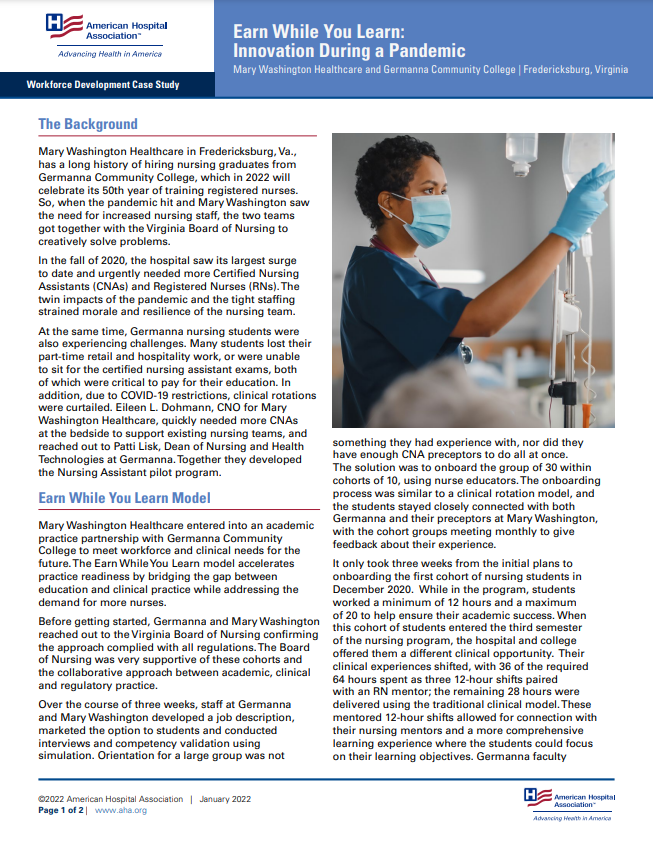Earn While You Learn: Innovation During a Pandemic
Mary Washington Healthcare and Germanna Community College | Fredericksburg, Virginia
The Background
Mary Washington Healthcare in Fredericksburg, Va., has a long history of hiring nursing graduates from Germanna Community College, which in 2022 will celebrate its 50th year of training registered nurses. So, when the pandemic hit and Mary Washington saw the need for increased nursing staff, the two teams got together with the Virginia Board of Nursing to creatively solve problems.
In the fall of 2020, the hospital saw its largest surge to date and urgently needed more Certified Nursing Assistants (CNAs) and Registered Nurses (RNs). The twin impacts of the pandemic and the tight staffing strained morale and resilience of the nursing team.
At the same time, Germanna nursing students were also experiencing challenges. Many students lost their part-time retail and hospitality work, or were unable to sit for the certified nursing assistant exams, both of which were critical to pay for their education. In addition, due to COVID-19 restrictions, clinical rotations were curtailed. Eileen L. Dohmann, CNO for Mary Washington Healthcare, quickly needed more CNAs at the bedside to support existing nursing teams, and reached out to Patti Lisk, Dean of Nursing and Health Technologies at Germanna. Together they developed the Nursing Assistant pilot program.
Earn While You Learn Model
Mary Washington Healthcare entered into an academic practice partnership with Germanna Community College to meet workforce and clinical needs for the future. The Earn While You Learn model accelerates practice readiness by bridging the gap between education and clinical practice while addressing the demand for more nurses.
Before getting started, Germanna and Mary Washington reached out to the Virginia Board of Nursing confirming the approach complied with all regulations. The Board of Nursing was very supportive of these cohorts and the collaborative approach between academic, clinical and regulatory practice.
Over the course of three weeks, staff at Germanna and Mary Washington developed a job description, marketed the option to students and conducted interviews and competency validation using simulation. Orientation for a large group was not something they had experience with, nor did they have enough CNA preceptors to do all at once.
The solution was to onboard the group of 30 within cohorts of 10, using nurse educators. The onboarding process was similar to a clinical rotation model, and the students stayed closely connected with both Germanna and their preceptors at Mary Washington, with the cohort groups meeting monthly to give feedback about their experience.
It only took three weeks from the initial plans to onboarding the first cohort of nursing students in December 2020. While in the program, students worked a minimum of 12 hours and a maximum of 20 to help ensure their academic success. When this cohort of students entered the third semester of the nursing program, the hospital and college offered them a different clinical opportunity. Their clinical experiences shifted, with 36 of the required 64 hours spent as three 12-hour shifts paired with an RN mentor; the remaining 28 hours were delivered using the traditional clinical model. These mentored 12-hour shifts allowed for connection with their nursing mentors and a more comprehensive learning experience where the students could focus on their learning objectives. Germanna faculty members also completed rounds for all nurse assistants. For evaluation purposes, the students also took the CaseyFink Transition to Practice survey pre- and post-36 hour rotation.
Building on the program’s success, the second cohort applied in March 2021 during spring break, and 15 additional students were onboarded. During the second cohort, a group of CNAs asked to precept and help teach nursing assistants the CNA role so they could understand it better upon graduation. Again, the response from both preceptors and students was unanimously positive. The third cohort began in June 2021 with 16 students, and a fourth cohort started in Dec 2021, which included a partnership with a second school of nursing.
Lessons Learned
It was important that the experience be positive for the students, as ultimately Mary Washington wanted to employ them after graduation, and the student feedback was indeed positive. One student stated that they did more clinical skills in one shift than in all previous clinicals combined. Germanna faculty also used journaling to assess student learnings, and saw the language shift from, “I’m helping the nurse” to “I was the nurse.”
The clinical care team saw the nursing assistant program as help they needed as well as a richer opportunity to train the next generation.
Initially, Germanna and Mary Washington planned to bring on three cohorts a year, but when they onboarded the March cohort, there was not enough time. As a result, they plan to onboard in June and December each year, using larger cohorts of up to 60 students.
The December 2021 cohort included an additional nursing school. This apprenticeship-like model is being considered for other clinical roles, like surgical technologists, and other non-clinical roles. The teams are starting to consider mentor models and opportunities for nursing assistants to join night and weekend shifts to better understand the differences before they graduate.
Both Mary Washington Healthcare staff and Germanna Community College faculty say that their only regret is not beginning this program sooner. With the expansion of the nursing assistant program, Mary Washington Healthcare is ensuring a more experienced and consistent health care workforce for present day and the future.


